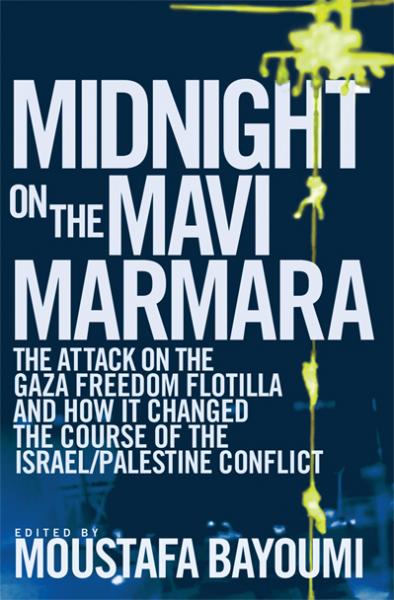What the Massacre Means
 Midnight on the Mavi Marmara: The Attack on the Gaza Freedom Flotilla and How It Changed the Course of the Israel/Palestine Conflict
Midnight on the Mavi Marmara: The Attack on the Gaza Freedom Flotilla and How It Changed the Course of the Israel/Palestine Conflict
Edited by Moustafa Bayoumi
OR Books, 2010, 256 pages, $16
On May 31, 2010, Israeli commandos boarded ships that were attempting to break Israel’s crippling blockade of Gaza. On the Turkish boat Mavi Marmara, nine were killed and dozens wounded. The attacks in international waters shocked the world, and Israel scrambled to control the damage to its reputation, portraying the unarmed passengers as a group of savage Islamist terrorists “lynching” defenseless Israeli soldiers. The essays in Midnight on the Mavi Marmara are a comprehensive antidote to Israel’s attempt to spin the events. The reports from eyewitnesses aboard the Mavi Marmara are clear: Israeli commandos rappelled onto the Marmara, opened fire, and killed nine people. A September 2010 U.N. report by three human rights experts found the Israeli raid to be illegal, “disproportionate,” and brutal.
The testimony of Ken O’Keefe, a former U.S. marine and a prominent Palestine solidarity activist, is enough to conclude that Israel’s propaganda about the flotilla being a “hate boat” intent on injuring or killing Israeli soldiers is a farce. O’Keefe describes how he was involved in the forcible separation of weapons from Israeli soldiers who had already “murdered two brothers that I had seen that day, including one brother with a bullet entering dead center in his forehead, in what appeared to be an execution.” Continuing his testimony, O’Keefe says: “We had in our full possession three completely disarmed and helpless commandos. These boys were at our mercy … But they did not face an enemy as ruthless as they. Instead, the woman [sic] provided basic first aid, and ultimately they were released, battered and bruised for sure, but alive.”
Beyond the eyewitness accounts, the book includes exceptional analyses of what the attack means and where the international solidarity movement goes from here. Philip Weiss and Adam Horowitz, editors of the blog Mondoweiss, aptly call the attack on the flotilla a moment that has caused “many to consider what Zionism has built in the Middle East.” Yousef Munayyer, executive director of the Washington, D.C.-based Palestine Center, reminds readers that Israel massacring civilians is not a new phenomenon, nor is the world’s apparent unwillingness to hold Israel accountable for war crimes.
While it is a one-stop shop for all things Freedom Flotilla, Midnight on the Mavi Marmara has a dearth of original content, with most contributions being reprints. It’s an understandable shortcoming given the lightning-quick turnaround—the book was published two months after the Israeli raid—but it reads more as an immediate reaction to the flotilla killings than a reflection on how and why the flotilla marks a “turning point” in the Israel/Palestine conflict.
By and large, though, if one wants to understand the attack on the flotilla and the utter necessity of building an international solidarity movement that will finally bring Israeli apartheid down, this is the book to read. It couldn’t have come out at a better time; while the world’s media incessantly focus on “peace talks” and what the Obama administration will do next, the real work of bringing about liberation for the Palestinian people can be found in efforts like the Freedom Flotilla.
Adam Shapiro, a co-founder of the International Solidarity Movement, succinctly closes out the book with his piece on the boycott, divestment, and sanctions movement and the effort to break the blockade of Gaza through ever-escalating direct action: “The days of the oppression of Palestinians—whether in the Occupied Palestinian Territories, in refugee camps, or in the diaspora—are numbered. It is now in all our power to expedite that day of liberation.”
A version of this article originally appeared in the September 29, 2010, issue of The Indypendent.



